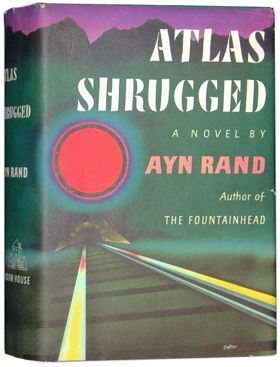I suggested a couple of months ago that the economic turmoil in Greece and Venezuela is somewhat akin to a real-life version of Atlas Shrugged.
And I’ve also used that analogy when writing about France and Detroit.
But I’m probably not doing justice to Ayn Rand’s famous novel because Atlas Shrugged is not just about an economy that collapses under the weight of too much government regulation, intervention, and control.
I probably won’t give the right description since I’m a policy wonk rather than philosopher, but Atlas Shrugged is also about the perils of self-sacrifice.
And I couldn’t help but think about that aspect of the book when I read the comments of certain Greek politicians during the recent bailout vote in Athens.
If you scroll down to the 14:40 mark of this timeline from the U.K.-based Telegraph, you’ll find some remarkable comments that sound like they came straight from Ayn Rand’s book.
Greece’s ruling Syriza party has accused David Cameron of being mean over his objections to allowing British taxpayer’s money to be used to help Athens meet upcoming debt payments. …Mr Cameron’s attitude was described as cold-hearted by Nikos Xydakis, a deputy culture minister in Syriza. “Mr Cameron must explain to the European people and 11 million Greeks why he wants them to suffer a social crisis,” Mr Xydakis told The Telegraph. “This is not about politics, this is about human souls.”
Wow. I might agree that David Cameron is “mean,” but I think his cruelty is directed against British taxpayers, not Greek politicians.
But let’s stick with our main topic. Notice how the moochers in Greece are trying to use guilt as a weapon. I’m sure some Ayn Rand experts will correct me if I’m wrong, but the aforementioned comments definitely sound like passages from Atlas Shrugged.
That being said, the Germans apparently have more in common with John Galt than Jim Taggart. Here are some excerpts from a column in the New York Times by Jacob Soll, a professor from the University of Southern California. He recently attended a conference in Germany and found very little sympathy for the Greeks.
…when the German economists spoke…, a completely different tone took over the room. Within the economic theories and numbers came a moral message: The Germans were honest dupes and the Greeks corrupt, unreliable and incompetent. …the Greeks destroyed themselves over the past four years. Now the Greeks deserved what was coming to them. …Debtors who default, they explained, would simply have to suffer…a country like Greece…did not seem to merit empathy. …When the panel split up, German attendees circled me to explain how the Greeks were robbing the Germans. They did not want to be victims anymore.
Wow, who knew the Germans were a bunch of closet Randians!
No wonder the Greek politicians decided to target David Cameron instead.
For what it’s worth, I must have some German blood in my veins because I wasn’t overly sympathetic to Greece in this interview.
I even referred (again) to “looters” and “moochers,” which are terms used in Rand’s book.
I’ll make two comments about the interview.
- My prediction about the vote in Greece was correct. Though I wish I had been wrong because the best long-run outcome(both for the Greek people and the world’s taxpayers) is an end to bailouts.
- I mentioned that there will be more debt-crisis dominoes at some point in the future. I hope I’m wrong, but it’s hard to be optimistic when you look at long-run fiscal estimates from the IMF, BIS, and OECD.
P.S. Lots of what happens in Washington also is disturbingly similar to scenes from Atlas Shrugged, particularly the corrupt Obamacare waiver process.

